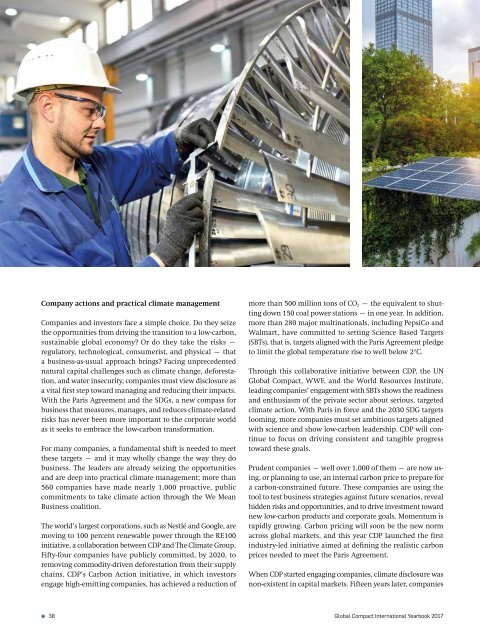Global Compact International Yearbook 2017
Sustainability in Troubled Times We life in times of uncertainty and global (dis)Order. „Understanding global mega-trends is crucial. We live in times of multiple, evolving and mutually-reinforcing shifts“, says UN Secretary-General António Guterres. He adds: „These dynamics, of geopolitical, demographic, climatic, technological, social and economic nature, enhance threats and opportunities on an unprecedented scale.“ Therefore sustainability in troubled times is the key topic of the Global Compact International Yearbook 2017, edited by macondo publishing.
Sustainability in Troubled Times
We life in times of uncertainty and global (dis)Order. „Understanding global mega-trends is crucial. We live in times of multiple, evolving and mutually-reinforcing shifts“, says UN Secretary-General António Guterres. He adds: „These dynamics, of geopolitical, demographic, climatic, technological, social and economic nature, enhance threats and opportunities on an unprecedented scale.“ Therefore
sustainability in troubled times is the key topic of the Global Compact International Yearbook 2017, edited by macondo publishing.
You also want an ePaper? Increase the reach of your titles
YUMPU automatically turns print PDFs into web optimized ePapers that Google loves.
Company actions and practical climate management<br />
Companies and investors face a simple choice. Do they seize<br />
the opportunities from driving the transition to a low-carbon,<br />
sustainable global economy? Or do they take the risks –<br />
regulatory, technological, consumerist, and physical – that<br />
a business-as-usual approach brings? Facing unprecedented<br />
natural capital challenges such as climate change, deforestation,<br />
and water insecurity, companies must view disclosure as<br />
a vital first step toward managing and reducing their impacts.<br />
With the Paris Agreement and the SDGs, a new compass for<br />
business that measures, manages, and reduces climate-related<br />
risks has never been more important to the corporate world<br />
as it seeks to embrace the low-carbon transformation.<br />
For many companies, a fundamental shift is needed to meet<br />
these targets – and it may wholly change the way they do<br />
business. The leaders are already seizing the opportunities<br />
and are deep into practical climate management; more than<br />
560 companies have made nearly 1,000 proactive, public<br />
commitments to take climate action through the We Mean<br />
Business coalition.<br />
The world’s largest corporations, such as Nestlé and Google, are<br />
moving to 100 percent renewable power through the RE100<br />
initiative, a collaboration between CDP and The Climate Group.<br />
Fifty-four companies have publicly committed, by 2020, to<br />
removing commodity-driven deforestation from their supply<br />
chains. CDP’s Carbon Action initiative, in which investors<br />
engage high-emitting companies, has achieved a reduction of<br />
more than 500 million tons of CO 2 – the equivalent to shutting<br />
down 150 coal power stations – in one year. In addition,<br />
more than 280 major multinationals, including PepsiCo and<br />
Walmart, have committed to setting Science Based Targets<br />
(SBTs), that is, targets aligned with the Paris Agreement pledge<br />
to limit the global temperature rise to well below 2°C.<br />
Through this collaborative initiative between CDP, the UN<br />
<strong>Global</strong> <strong>Compact</strong>, WWF, and the World Resources Institute,<br />
leading companies’ engagement with SBTs shows the readiness<br />
and enthusiasm of the private sector about serious, targeted<br />
climate action. With Paris in force and the 2030 SDG targets<br />
looming, more companies must set ambitious targets aligned<br />
with science and show low-carbon leadership. CDP will continue<br />
to focus on driving consistent and tangible progress<br />
toward these goals.<br />
Prudent companies – well over 1,000 of them – are now using,<br />
or planning to use, an internal carbon price to prepare for<br />
a carbon-constrained future. These companies are using the<br />
tool to test business strategies against future scenarios, reveal<br />
hidden risks and opportunities, and to drive investment toward<br />
new low-carbon products and corporate goals. Momentum is<br />
rapidly growing. Carbon pricing will soon be the new norm<br />
across global markets, and this year CDP launched the first<br />
industry-led initiative aimed at defining the realistic carbon<br />
prices needed to meet the Paris Agreement.<br />
When CDP started engaging companies, climate disclosure was<br />
non-existent in capital markets. Fifteen years later, companies<br />
38<br />
<strong>Global</strong> <strong>Compact</strong> <strong>International</strong> <strong>Yearbook</strong> <strong>2017</strong>

















